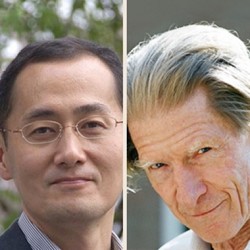 Cellular reprogramming wins Nobel Prize
Cellular reprogramming wins Nobel Prize
The ongoing journey of scientific investigation into the world of cell reprogramming received a celebratory boost as John Gurdon and Shinya Yamanaka were awarded The Nobel Prize in Physiology or Medicine for“the discovery that mature cells can be reprogrammed to become pluripotent”.
Each cell in our body is carefully tailored to carry out a specificrole. It can be hard to imagine that they all share identical geneticinformation. But in 1962, John Gurdon discovered that a cell’sspecialisation is reversible. Previously, the belief was that asdevelopment proceeded, ‘heritable traits’ were irretrievably lost.This, it was thought, explained why development occurred in onedirection, with cells and organisms becoming more specific and lessflexible over time. When Gurdon revealed that replacing the nucleusfrom a frog’s egg cell with that from a mature intestinal cell couldstill spawn a healthy tadpole, he shattered this preconception. Hisfamous experiment proved that adult cells retain all the informationnecessary to form a whole organism.
Gurdon’s cloned tadpole is the foundation of much of the research atthe CSC. It unveiled the importance of gene regulation, rather thangene loss. Some 40 years after Gurdon’s experiments, Shinya gave theworld the tools to reprogram cells to their pluripotent state, capableof developing into any cell type in the body. He showed that activatingjust four genes was sufficient to rewind adult cells to stem cell form.
The basic research that lit the fuse of this strand of developmentalbiology has spurred the science on to the point where today itsclinical applications are beginning to be realised. Professor AmandaFisher, director of the CSC, said, “I find it hard to imagine twopeople more deserving of a Nobel Prize.”
A large proportion of the CSC’s research owes a significant debt to theadvances of Gurdon, who worked at the MRC Laboratory of MolecularBiology from 1971-83, and Shinya. Every cell retains the capacity tocreate a full organism, or any specific part of it. Throughreprogramming, it can be repurposed to do just that.
A cell’s journey through development (and back again) is governed by acocktail of epigenetic factors. How the molecular machinery of our bodycontrols and dictates the expression of our genome is at the heart ofthe research being carried out in groups across the CSC.
This focus on epigenetics, and the growing appreciation of theinfluence it has over life, is possible because of these NobelPrize-winning revelations. The scientific opportunities stemmingdirectly from induced pluripotency are broad. The fine-tuning of thisphenomenon – how epigenetic marks on DNA and chromatin dictate thereversal of cell differentiation – is beginning to crystallise. TheNobel Prize has recognised the importance of this field, a factor thatwill no doubt augment investigations of this nature.
Images available under a creative commons license
